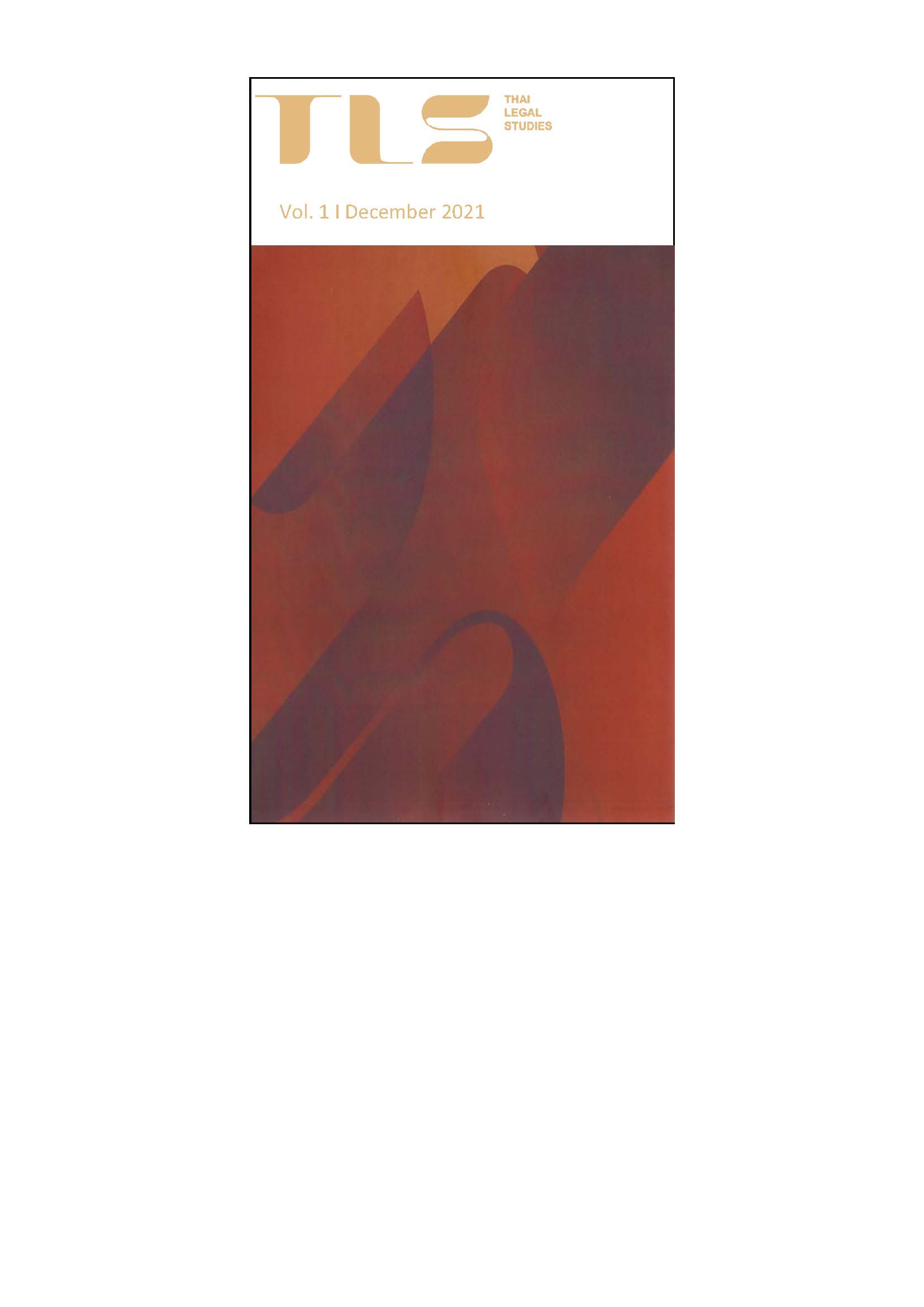Possibilities for Decentralisation in Thailand: A View from Chiang Mai
DOI:
https://doi.org/10.54157/tls.246131Keywords:
Decentralisation, Provincial autonomy, Local democracyAbstract
In this article we examine radical proposals for political, administrative and fiscal decentralisation in Thailand which were developed for Chiang Mai as a potential model for Thailand as a whole. They lay emphasis on local self-government and citizen participation. We argue that these proposals offer a way forward for a Thai decentralisation process that has yet to proceed to the extent envisaged when it was commenced in the 1990s as part of democratisation, embraced most notably in the 1997 Constitution. Moreover, this process, we argue, offers a way out of the extreme confrontation between the yellow and red factions that has troubled Thailand since 2005. As Thailand returns to civilian rule after five years of military government, and local and provincial government comes once more to the fore, we argue that the Chiang Mai Metropolitan Administration Bill of 2013 offer more local democracy as well as imaginative ways of recruiting the enthusiasm of local stakeholders in a system designed to link provincial and local authorities, and the citizenry, in a virtuous circle of democracy and development.
References
Apinya Wipatayotin. “Chiang Mai Air Pollution Worst in the World.” Bangkok Post (13 March 2019). https://www.bangkokpost.com/thailand/general/1643388/chiang-mai-air-pollution-worst-in-the-world
Baker, Chris, and Pasuk Phongpaichit. A History of Thailand (3rd edn, Cambridge University Press 2014). https://doi.org/10.1017/CBO9781139656993
Bowie, Katherine A. Of Beggars and Buddhas: The Politics of Humor in the Vessantara Jataka in Thailand (The University of Wisconsin Press 2017). https://doi.org/10.1086/699262
“Chiang Mai Shrouded in Haze.” Thailand News (23 January 2019). https://www.thailandnews.co/2019/01/chiang-mai-shrouded-in-haze/
Chularat Saengpassa. “Urgent: Chiang Mai Needs Bangkok’s Spare Air Purifiers.” Nation Thailand (5 April 2019). https://www.nationthailand.com/in-focus/30367199
Coedès, George. The Indianized States of South-East Asia (Walter F. Vella (ed), Susan Brown Cowing (tr), University of Hawaii Press 1968).
Constitute. “Thailand 2017.” Constitute. https://www.constituteproject.org/constitution/Thailand_?lang=en
“Coronavirus Ate Local Poll Budget, Claims Wissanu.” Bangkok Post (15 June 2020). https://www.bangkokpost.com/thailand/politics/1934708/coronavirus-ate-local-poll-budget -claims-wissanu
“Decentralised Governance for Development: A Combined Practice Note.” United Nations Development Programme (2015). https://www.undp.org/publications/decentralised-governance-development-combined-practice-note
“EC ‘Ready’ for Local Elections.” Bangkok Post (12 August 2020). https://www.bangkokpost.com/thailand/politics/1966795/ec-ready-for-local-elections
Engel, David M. “Blood Curse and Belonging in Thailand: Law, Buddhism, and Legal Consciousness.” In Andrew Harding and Munin Pongsapan (eds), Thai Legal History: From Traditional to Modern Law (Cambridge University Press 2021). https://doi.org/10.1017/9781108914369.008
Engel, David M., and Lynette Chua. “State and Personhood in Southeast Asia: The Promise and Potential for Law and Society Research.” (2015) 2 Asian Journal of Law and Society 211. https://doi.org/10.1017/als.2015.10
Farrell, James Austin. “A New Chiang Mai – Self-management of the Northern Rose.” Chiang Mai City News (13 September 2012). http://www.chiangmaicitynews.com/news.php?id=814
Ferrara, Federico. The Political Development of Modern Thailand (Cambridge University Press 2015). https://doi.org/10.1017/CBO9781107449367
“The Future is Decentralised.” United Nations Development Programme (2 March 2018). https://www.undp.org/content/undp/en/home/librarypage/corporate/the-future-is-decentralised.html
Grichawat Lowatcharin. “Along Came the Junta: The Evolution and Stagnation of Thailand’s Local Governance.” Kyoto Review of Southeast Asia (October 2014). https://kyotoreview.org/yav/along-came-the-junta-the-evolution-and-stagnation-of-thailands-local-governance/
Harding, Andrew. “The Constitutional Dimensions of Decentralization and Local Government in Asia.” In Adriaan W. Bedner and Barbara M. Oomen (eds), Real Legal Certainty and its Relevance: Essays in Honour of Jan-Michiel Otto (Leiden University 2018). https://doi.org/10.24415/9789400603301-005
Harding, Andrew, and Peter Leyland. The Constitutional System of Thailand: A Contextual Analysis (Hart Publishing 2012).
Harding, Andrew, and Rawin Leelapatana. “Constitution-Making in 21st-Century Thailand: The Continuing Search for a Perfect Constitutional Fit.” (2019) 7 Chinese Journal of Comparative Law 266. https://doi.org/10.1093/cjcl/cxz009
Harding, Andrew, and Rawin Leelapatana. “Towards Recentralisation?: Thailand’s 2014 Coup, Tutelage Democracy and their Effects on Local Government.” 50 Shades of Federalism. http://50shadesoffederalism.com/case-studies/towards-recentralisation-thailands-2014-coup-tutelage-democracy-and-their-effects-on-local-government/
Hodos, Jerome I. “Identity and Governance in the Second City.” In Jerome I. Hodos (ed), Second Cities: Globalisation and Local Politics in Manchester and Philadelphia (Temple University Press 2011).
International Crisis Group. “COVID-19 and a Possible Political Reckoning in Thailand.” Inter-national Crisis Group (4 August 2020). https://www.crisisgroup.org/asia/south-east-asia/thailand/309-covid-19-and-possible-political-reckoning-thailand
Jackson, Peter A. “The Ambiguities of Semicolonial Power in Thailand.” In Rachel V. Harrison and Peter A. Jackson (eds), The Ambiguous Allure of the West: Traces of the Colonial in Thailand (Hong Kong University Press 2010). https://doi.org/10.5790/hongkong/9789622091214.003.0002
Kidambi, Prashant. The Making of an Indian Metropolis: Colonial Governance and Public Culture in Bombay, 1890–1920 (Ashgate 2007).
Malesky, Edmund J., and Francis E Hutchinson. “Varieties of Disappointment: Why Has Decentralisation Not Delivered on its Promises in Southeast Asia?” (2016) 33 Journal of Southeast Asian Economies 125. https://doi.org/10.1355/ae33-2a
Palese, Michela. “The Irish Abortion Referendum: How a Citizens’ Assembly Helped to Break Years of Political Deadlock.” Electoral Reform Society (29 May 2018). https://www.electoral-reform.org.uk/the-irish-abortion-referendum-how-a-citizens-assembly-helped-to-break-years-of-political-deadlock/
Prin Nithat-ek. “The Rise of Antagonism: The Chiang Mai Province People’s Network for Self-Governing Administration and Its Reaction Against the Hegemonic Centralising State.” (2017) 13 Journal of Social Sciences, Naresuan University 187.
Rawin Leelapatana. “The Thai-Style Democracy in Post-1932 Thailand and its Challenges: A Quest for Nirvana of Constitutional Saṃsāra in Thai Legal History Before 1997.” In Andrew Harding and Munin Pongsapan (eds), Thai Legal History: From Traditional to Modern Law (Cambridge University Press 2021). https://doi.org/10.1017/9781108914369.016
Rawin Leelapatana and Chompunoot Tangthavorn. “Thailand: Emergency Responses or More Social Disturbance.” In Victor V. Ramraj (ed), Covid-19 in Asia: Law and Policy Contexts (Oxford University Press 2021). https://doi.org/10.1093/oso/9780197553831.003.0011
Riggs, Fred W. Thailand: The Modernization of a Bureaucratic Polity (East-West Center Press 1966). https://doi.org/10.1515/9780824885458
Sarasawadee Ongsakul. History of Lanna (Chitraporn Tanratanakul tr, Silkworm Press 2005).
Shair-Rosenfield, Sarah. “The Causes and Effects of the Local Government Code in the Philippines: Locked in a Status-quo of Weakly Decentralised Authority?” (2016) 33 Journal of Southeast Asian Economies 157. https://doi.org/10.1355/ae33-2c
“Smog Worse in Greater Bangkok.” Bangkok Post (22 January 2019). https://www.bangkokpost.com/thailand/general/1615618/smog-worse-in-greater-bangkok
Strangio, Sebastian. “In Thailand, Local Elections See Stagnating Progressive Vote.” The Diplomat (Southeast Asia, 22 December 2020). https://thediplomat.com/2020/12/in-thailand-local-elections-see-stagnating-progressive-vote/
Thongchai Winichakul. Siam Mapped: A History of the Geo-Body of a Nation (University of Hawaii Press 1994).
Unger, Daniel, and Chandra Mahakanjana. “Decentralisation in Thailand.” (2016) 33 Journal of Southeast Asian Economies 172. https://doi.org/10.1355/ae33-2d
“World Development Report 1997: The State in a Changing World (English).” World Bank Group. http://documents.worldbank.org/curated/en/518341468315316376/World-development-report-1997-the-state-in-a-changing-world
“World Development Report 2000/2001: Attacking Poverty (English).” World Bank Group. http://documents.worldbank.org/curated/en/230351468332946759/World-development-report-2000-2001-attacking-poverty
Sources in Thai
CM Publica. “เครือข่ายแก้ไขปัญหาหมอกควันเชียงใหม่ บุกยื่นหนังสือผู้ว่าฯ เร่งแก้ปัญหาหมอกควัน.” CM Publica (19 มีนาคม 2562). [CM Publica. “Networks Against the Haze Stormed to Lodge a Petition Before the Chiang Mai Governor to Resolve the Haze Crisis.” CM Publica (19 March 2019).] http://www.cmpublica.com/?p=2719
ข่าวสด. “‘คนไร้บ้านเชียงใหม่’ ถูกจับ-ส่งฟ้องศาล ข้อหาออกจากบ้าน ฝ่าเคอร์ฟิว.” ข่าวสด (22 เมษายน 2563). [Khaosod. “‘Vagrant in Chiang Mai’ Arrested and Prosecuted for Violating Curfew.” Khaosod (22 April 2020).] https://www.khaosod.co.th/covid-19/news_3994471
ชำนาญ จันทร์เรือง. “การกระจายอำนาจคืออนาคตของประเทศไทย.” ประชาไทย (15 มีนาคม 2561). [Chamnan Chanruang. “Decentralisation is the Future of Thailand.” Prachatai (15 March 2018).] https://prachatai.com/journal/2018/03/75884
เชียงใหม่นิวส์. “เชียงใหม่ จังหวัดจัดการตนเอง ฝันนี้ไกลคงไปไม่ถึง!! หรือยังไง.” เชียงใหม่นิวส์ (4 สิงหาคม 2561). [Chiang Mai News. “Chiang Mai as PSG an Overreaching Dream!! or What?.” Chiang Mai News (4 August 2018).] https://www.chiangmainews.co.th/page/archives/770569/
ณัฐพล อยู่รุ่งเรืองศักดิ์. ประวัติศาสตร์ล้านนาฉบับสังเขป (โรงพิมพ์มหาวิทยาลัยศิลปากร 2558). [Natthabala Yurungruangsakdi. Short History of Lanna (Silapakorn University Press 2015).]
ไทยพีบีเอส. “เสนอ พ.ร.บ. เชียงใหม่มหานคร.” Thai PBS (26 ตุลาคม 2556). [Thai PBS. “The Chiang Mai Bill Proposed.” Thai PBS (26 October 2013).] https://news.thaipbs.or.th/content/203740
ประชาไทย. “นักศึกษา ม.เชียงใหม่ เรียกร้องผู้บริหารรับมือฝุ่น PM 2.5- COVID-19.” ประชาไทย (16 มีนาคม 2563). [Prachatai. “Students of Chiang Mai University Vividly Asking University Executive Team to deal with PM 2.5 and Covid-19.” Prachatai (16 March 2020).] https://prachatai.com/journal/2020/03/86800
มรุต วันทนากร และ ดรุณี หมั่นสมัคร. “ประวัติและความเป็นมาของเทศบาล.” (สถาบันพระปกเกล้า). [Marut Wanthanākō̜n and Darunee Mansamak. “The History of Thailand’s Municipalities.” (King Prajadhipok’s Institute).]
สัญชัย ศรีตระกูล. “แนวคิดและข้อเสนอการเป็นจังหวัดจัดการตนเองของฝ่ายต่าง ๆ ในจังหวัดเชียงใหม่.” (วิทยานิพนธ์ ศิลปศาสตรมหาบัณฑิต, วิทยาลัยพัฒนศาสตร์ ป๋วย อึ๊งภากรณ์, มหาวิทยาลัยธรรมศาสตร์ 2558). [Sanchai Sritrakool. “Concepts and Proposals for the Self-governing of Chiang Mai Province, Thailand.” (Master of Arts Thesis, Puey Ungphakorn School of Development Studies, Thammasat University 2015).]
Published
Issue
Section
License
Copyright (c) 2021 Andrew Harding, Rawin Leelapatana

This work is licensed under a Creative Commons Attribution 4.0 International License.
Authors retain copyright and publishing rights without restrictions, but grant Thai Legal Studies the right of first publication in English and to distribute the work under a Creative Commons Attribution 4.0 International Public License (“CC BY 4.0”). It allows others to freely share the work, including the making of translations. There is no charge or fee for readers to immediately view published articles or content, and users are allowed to read, download, copy, distribute, print, search, link to the full texts of the articles, or use them for any other lawful purpose, without asking prior permission from Thai Legal Studies or the author(s), the only requirement being that an acknowledgement is given of the work’s authorship and its initial publication in English by Thai Legal Studies.







